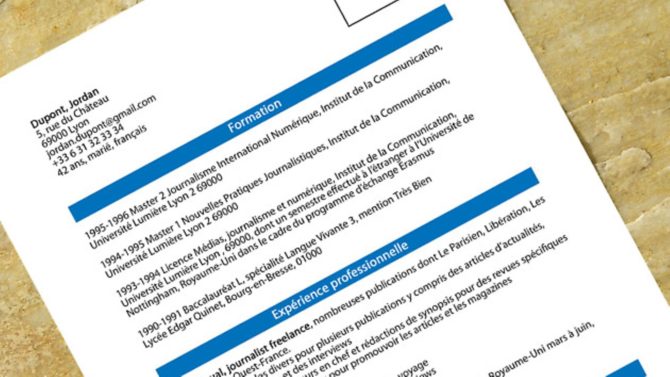How to write a great French CV

If you’re applying for jobs in France then make sure you use this simple guide to write a great French CV in the correct format and make sure you stand out from the other candidates

A French CV is shorter than a standard UK CV – ideally just one page, but it can stretch to two pages if necessary. It doesn’t have to be a gap-free account of your education and job history, instead, just include the previous jobs and skills that are relevant to the position you are applying for. French employers put great emphasis on academic achievement so make sure you include all of your qualifications from A-levels onwards.
Read more: How to find a job in France
Take time to translate it properly and if possible get a native French speaker to check your CV before you send it. Use this template as a starting point:

1. Personal information
Start your French CV with your personal details. These should include: name (remember that the French write their surname first), address, email address, telephone number, age, marital status and nationality (if you have a good level of French it might be useful to include it after your nationality). It is also common practice in France to include a passport-sized photo of yourself with your CV. Make sure this is a professional photo of you and not a holiday snap!

2. Education – Formation
Include all of your academic qualifications from A-level onwards. If you have English qualifications then indicate what the qualification equivalent is in France – for example the French equivalent of A-level English Literature Grade B would be Baccalauréat: literature anglaise, mention bien.

3. Work history – Expérience professionnelle
Include relevant previous jobs, starting with the most recent and working backwards. Include the year(s) you worked there, your job title, company name and length of employment, as well as a concise list of your responsibilities. Make sure you include the industry you worked in, in case the company isn’t well known in France. You don’t have to include all of your previous jobs, just choose the ones most relevant to the position you are applying for.
4. Specific skills – Compétences spécifiques
This is where you include your language skills (i.e. what languages you speak and to what level – native language, bilingual, fluent, proficient etc.); whether you have a driving licence and your computer skills.
5. Hobbies/leisure activities – Centres d’intérêts
Keep this short and try to choose hobbies that could be relevant to the position you are applying for or things that set you apart from the crowd. Don’t be tempted to exaggerate as you may have to talk about them in an interview!
Like this? You might enjoy:
The best places to live and work in France
Share to: Facebook Twitter LinkedIn Email


